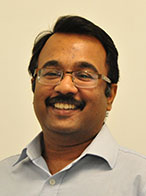Adaikalavan RAMASAMY
RESEARCH
Dr. Ramasamy’s research focuses on the application of next-generation sequencing (NGS) with single-cell and spatial transcriptomics to understand gene expression, tissue organisation and cellular heterogeneity and regulatory interactions in health and disease. His group develops and applies computational workflows for large-scale transcriptomic analyses, emphasizing reproducibility, data visualization, and accessibility for the broader genomics community. His group is also passionate about training and empowering others in genomics data science.
BIOGRAPHY
Dr Ramasamy is a Principal Scientist at Genome Institute of Singapore and A*STAR Skin Research Labs, A*STAR. He holds a PhD in Applied Statistics from the University of Oxford where he was supervised by Professor Doug Altman and Professor Chris Holmes. He completed his postdoctoral training at Imperial College London, University College London and King’s College London where he led and worked with large-scale international genome wide association studies (GWAS) in asthma and allergy, expression quantitative trait loci (eQTL) in neurogenetic disorders and vaccine immunogenicity correlates.
In A*STAR, he has worked on systems biology and the GUSTO and SPRESTO cohorts. During the COVID-19 pandemic, he also served as the platform lead for IT Infrastructure. Over the past 15 years, Dr Ramasamy has collaborated with leading researchers to unlock biological insights for various diseases. He has mentored numerous graduate students, research officers and postdoctoral fellows.
His team currently provides bioinformatics consultancy under a fee-for-service and collaboration model as well as training in genomics data science with a focus on single-cell and spatial technologies.
Selected Publications
- Dube C, Oguz G, Ong YHB, Sudhagar S, Prabhakar S, Ronshaugen M, Ramasamy A#, Lim CY#, Mace KA# (2025). Intrinsic changes in cell differentiation and identity drive impaired wound healing in aged female murine skin. Biogerontology. https://doi.org/10.1007/s10522-025-10340-w
- Muller J, Parizoto E, Antrobus R, Francis J, Bunce C, Stranks A, Nichols M, McClain M, Hill AVS, Ramasamy A#, Gilbert S# (2017). Development of an objective gene expression panel as an alternative to self-reported symptom scores in human influenza challenge trials. Journal of Translational Medicine 15:134 https://doi.org/10.1186/s12967-017-1235-3
- Ramasamy A*, Trabzuni D*, Guelfi S*, Varghese V, Smith C, Walker R, De T, UK Brain Expression Consortium, North American Brain Consortium, Coin L, de Silva R, Cookson M, Singleton A, Hardy J, Ryten M#, Weale ME# (2014). Genetic variability in the regulation of gene expression in multiple regions of the human brain. Nature Neuroscience 17(10):1418 – 28. http://dx.doi.org/10.1038/nn.3801
- Ramasamy A, Trabzuni T, Gibbs JR, Dillman A, Hernandez DG, Arepalli S, Walker R, Smith C, Shabalin AA, Li Y, Singleton AB, Cookson MR, Hardy J, Ryten M#, Weale ME# (2013). Resolving the polymorphism-in-probe problem is critical for correct interpretation of expression QTL studies. Nucleic Acids Research 41 (7):e88. http://dx.doi.org/10.1093/nar/gkt069
- Ramasamy A, Curjuric I, Coin LJ, Kumar A, McArdle WL, Imboden M, Leynaert B, Kogevinas M, Schmid-Grendelmeier P, Pekkanen J, Wjst M, Bircher AJ, Sovio U, Rochat T, Hartikainen A-L, Balding D, Jarvelin M-R, Probst-Hensch N, Strachan DP#, Jarvis DL# (2011). A genome-wide meta-analysis of genetic variants associated with allergic rhinitis and grass sensitization, and their interaction with birth order. Journal of Allergy and Clinical Immunology 128 (5) 996 – 1005. http://dx.doi.org/10.1016/j.jaci.2011.08.030
- Ramasamy A, Mondry A, Holmes CC, Altman DG (2008). Key Issues in Conducting a Meta-Analysis of Gene Expression Microarray Datasets. PLOS Medicine; 5(9):e184 http://dx.doi.org/10.1371/journal.pmed.0050184
PROFESSIONAL PROFILES
- Google Scholar: https://scholar.google.com/citations?user=8FZtwR0AAAAJ
- ORCID: https://orcid.org/0000-0002-7598-2892
A*STAR celebrates International Women's Day

From groundbreaking discoveries to cutting-edge research, our researchers are empowering the next generation of female science, technology, engineering and mathematics (STEM) leaders.
Get inspired by our #WomeninSTEM
.png?sfvrsn=2e525642_5)
